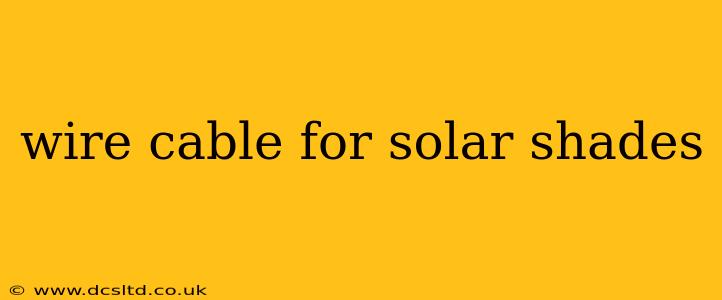Solar shades are a fantastic way to control sunlight and temperature in your home, offering energy savings and enhanced comfort. But the smooth operation of these shades relies heavily on the quality and suitability of the wire cable used in their mechanism. Choosing the wrong cable can lead to malfunctions, premature wear, and even safety hazards. This guide will delve into the crucial aspects of selecting the appropriate wire cable for your solar shades, answering common questions and providing expert insights.
What Type of Wire Cable is Best for Solar Shades?
The ideal wire cable for solar shades needs to balance strength, flexibility, and resistance to wear and tear. Several types are commonly used, each with its own advantages and disadvantages:
-
Stainless Steel Cable: This is a popular choice due to its high tensile strength, corrosion resistance, and durability. Stainless steel cables can withstand significant tension and are ideal for heavier shades or those experiencing frequent use. However, they can be slightly more expensive than other options.
-
Galvanized Steel Cable: A more budget-friendly alternative to stainless steel, galvanized steel cables offer good strength and corrosion resistance. The galvanization process protects the steel from rust, extending its lifespan. However, galvanized steel might not be as durable as stainless steel in harsh environments or with prolonged exposure to moisture.
-
Nylon-Coated Steel Cable: Combining the strength of steel with the flexibility and abrasion resistance of nylon, this type of cable offers a good compromise between cost and performance. The nylon coating protects the steel core from damage and reduces friction during operation.
The best type of cable for your solar shades will depend on factors such as the weight of the shade, the frequency of use, and the environmental conditions.
What Size Wire Cable Do I Need for My Solar Shades?
The required wire cable diameter depends on the weight and size of your solar shades. Heavier shades require thicker cables to support their weight and ensure smooth operation. Manufacturers usually specify the recommended cable diameter for their specific shade models. If you're unsure, consult the manufacturer's instructions or contact their customer service for guidance. Using a cable that's too thin can lead to breakage and malfunction, while using one that's too thick might cause unnecessary strain on the mechanism.
How Long Should My Wire Cable Be for My Solar Shades?
The length of the wire cable should be sufficient to allow for the full extension and retraction of your solar shades. Measure the distance from the motor or pulley system to the furthest point of the shade's travel, adding extra length for slack and adjustments. It's generally better to have slightly more cable than needed to account for potential adjustments or future modifications. Cutting the cable too short can significantly impact the functionality of your solar shades.
What are the Potential Problems with Using the Wrong Wire Cable?
Using an inappropriate wire cable can result in a number of issues, including:
- Shade Malfunction: A weak or insufficiently sized cable may break under stress, preventing the shade from retracting or extending properly.
- Premature Wear and Tear: Using a cable not designed for the weight of the shade can accelerate wear on the entire system, requiring premature replacements.
- Safety Hazards: A broken cable can cause the shade to fall unexpectedly, potentially causing damage or injury.
- Increased Maintenance Costs: Frequent repairs and replacements due to cable failure can significantly increase your long-term maintenance costs.
Can I Replace the Wire Cable Myself?
Replacing the wire cable on your solar shades is possible, but it requires some mechanical aptitude and familiarity with the shade's mechanism. Incorrect installation can damage the shade or even cause safety hazards. If you're unsure, it's best to consult a professional installer or contact the manufacturer for guidance. Always refer to the manufacturer's instructions before attempting any repairs or replacements.
By carefully considering these factors and choosing the correct wire cable, you can ensure your solar shades operate smoothly, efficiently, and safely for years to come. Remember, investing in quality components is crucial for the longevity and reliable performance of your solar shading system.
